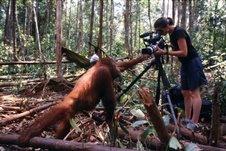Return from Kalimantan, Next Destination: Sumatra
Earlier this week we finished shooting in Central Kalimantan, following a successful field trip to Danau Sembuluh and Tanjung Puting National Park. We spent two days filming interviews and talking to people in the villages surrounding Lake Sembuluh, where everyone has a story, either about hardship caused by the encroachment of palm oil plantations, or about encountering wild animals such as orangutan, sun bear, and mouse deer who no longer have enough forest left to avoid encounters with local human populations. On the eastern borders of Tanjung Puting National Park a plantation-built track (running 6.4km into the park) has been made for the express purpose of facilitating illegal logging. The more degraded the national park land becomes through illegal logging, the easier it is for the palm oil companies to win concessions for the forest - why protect forest which has already been destroyed? You can hear the chainsaws working.
Tomorrow we leave for Bukit Tigapuluh National Park in Sumatra, where we plan to film the work of the Sumatran Tiger Conservation Program. Sumatra has a longer history with palm oil, some of the estates being over 100 years old. Still the expansion of oil palm and also the pulp and paper industries is putting serious pressure on natural forest. The World Bank estimated that all un-potected lowland forest would dissappear from Sumatra by the end of 2005. Let's hope this is not going to be true. There are certainly some very dedicated people working in the STCP who are working on expanding park boundaries and with it protected lowland areas. These areas are home to the Sumatran Orangutan (with only 7000 left in the wild) and the Sumatran Tiger (with only 500 left in the wild!). There are numerous other endangered species in these forest and we hope to capture footage of some of these over the next few weeks.
Tomorrow we leave for Bukit Tigapuluh National Park in Sumatra, where we plan to film the work of the Sumatran Tiger Conservation Program. Sumatra has a longer history with palm oil, some of the estates being over 100 years old. Still the expansion of oil palm and also the pulp and paper industries is putting serious pressure on natural forest. The World Bank estimated that all un-potected lowland forest would dissappear from Sumatra by the end of 2005. Let's hope this is not going to be true. There are certainly some very dedicated people working in the STCP who are working on expanding park boundaries and with it protected lowland areas. These areas are home to the Sumatran Orangutan (with only 7000 left in the wild) and the Sumatran Tiger (with only 500 left in the wild!). There are numerous other endangered species in these forest and we hope to capture footage of some of these over the next few weeks.





1 comment:
Hi Nick and Evie
where are you now?!
29th August
Sean
sw@naturealert.org
Post a Comment